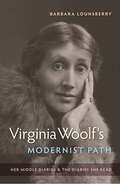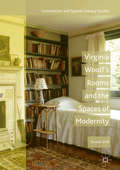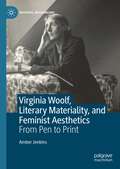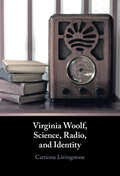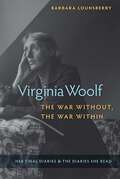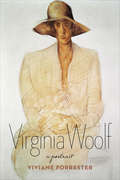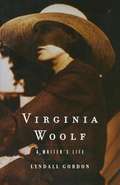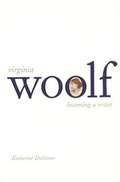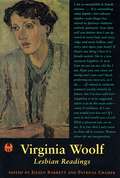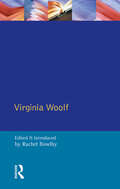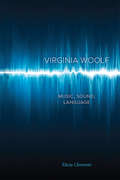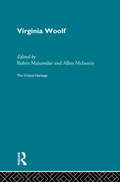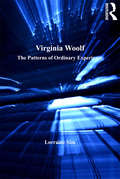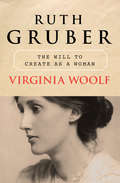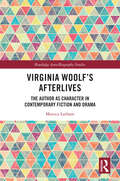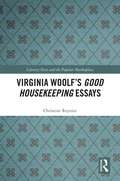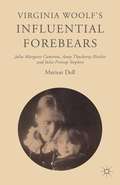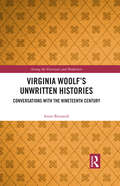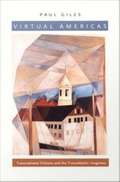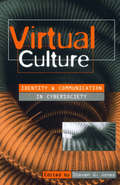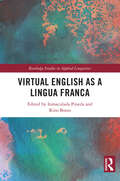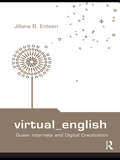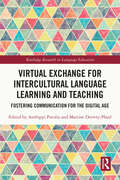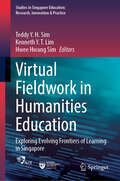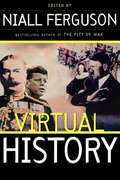- Table View
- List View
Virginia Woolf's Modernist Path: Her Middle Diaries and the Diaries She Read
by Barbara LounsberryChoice Outstanding Academic Title In this second volume of her acclaimed study of Virginia Woolf 's diaries, Barbara Lounsberry traces the English writer's life through the thirteen diaries she kept from 1918 to 1929--what is often considered Woolf’s modernist "golden age." During these interwar years, Woolf penned many of her most famous works, including Mrs. Dalloway, To the Lighthouse, Orlando, and A Room of One's Own. Lounsberry shows how Woolf's writing at this time was influenced by other diarists--Anton Chekhov, Katherine Mansfield, Jonathan Swift, and Stendhal among them--and how she continued to use her diaries as a way to experiment with form and as a practice ground for her evolving modernist style.Through close readings of Woolf 's journaling style and an examination of the diaries she read, Lounsberry tracks Woolf 's development as a writer and unearths new connections between her professional writing, personal writing, and the diaries she was reading at the time. Virginia Woolf's Modernist Path offers a new approach to Woolf 's biography: her life as she marked it in her diary from ages 36 to 46.
Virginia Woolf's Rooms and the Spaces of Modernity (Geocriticism and Spatial Literary Studies)
by Suzana ZinkThis book provides a fascinating account of rooms in selected works by Virginia Woolf. Casting them as spaces which are at once material, textual and emotional, the volume shows Woolf's rooms to be consistently connected to wider geographies of modernity and therefore central to her writing of gender, class, empire and the nation. The discussion moves "in and out of rooms," from the focus on travel in Woolf's debut novel, to the archival function of built space and literary heritage in Night and Day, the university as a male space of learning in Jacob's Room, the iconic A Room of One's Own and its historical readers, interior space as spatial history in The Years, and rooms as loci of memory in her unfinished memoir. Zink masterfully shows the spatial formation of rooms to be at the heart of Woolf's interweaving of the political and the aesthetic, revealing an understanding of space as dynamic and relational.
Virginia Woolf, Literary Materiality, and Feminist Aesthetics: From Pen to Print (Material Modernisms)
by Amber JenkinsThis book interrogates the relationship between the material conditions of Woolf's writing practices and her work as a printer and publisher at the Hogarth Press. In bringing to light her embodied literary processes, from drafting and composition to hand-printing and binding, this study foregrounds the interactions between Woolf's modernist experimentation and the visual and material aspects of her printed works. By drawing on the field of print culture, as well as the materialist turn in Woolf scholarship, it explores how her experience in print, book-design and publishing underlines her experimental writing, and how her literary texts are conditioned by the context of their production. This book, therefore, provides new ways of reading Woolf's modernism in the context of twentieth-century print, material, and visual cultures. By suggesting that Woolf's work at the Hogarth Press sensitized her to the significant role the visual aspects of a text play in its system of representation, it also considers the extent to which materiality informs both her work, as well as her engagement with Bloomsbury formalist aesthetics, which often exaggerate the distinction between visual and verbal modes of expression.
Virginia Woolf, Science, Radio, and Identity
by Catriona LivingstoneThis book offers an extensive analysis of Woolf's engagement with science. It demonstrates that science is integral to the construction of identity in Woolf's novels of the 1930s and 1940s, and identifies a little-explored source for Woolf's scientific knowledge: BBC scientific radio broadcasts. By analyzing this unstudied primary material, it traces the application of scientific concepts to questions of identity and highlights a single concept that is shared across multiple disciplines in the modernist period: the idea that modern science undermined individualized conceptions of the self. It broadens our understanding of the relationship between modernism and radio, modernism and science, and demonstrates the importance of science to Woolf's later novels.
Virginia Woolf, the War Without, the War Within: Her Final Diaries and the Diaries She Read
by Barbara LounsberryChoice Outstanding Academic Title In her third and final volume on Virginia Woolf’s diaries, Barbara Lounsberry reveals new insights about the courageous last years of the modernist writer’s life, from 1929 until Woolf’s suicide in 1941. Woolf turned more to her diary—and to the diaries of others—for support in these years as she engaged in inner artistic wars, including the struggle with her most difficult work, The Waves, and as the threat of fascism in the world outside culminated in World War II. During this period, the war began to bleed into Woolf’s diary entries. Woolf writes about Hitler, Mussolini, and Stalin; copies down the headlines of the day; and captures how war changed her daily life. Alongside Woolf’s own entries, Lounsberry explores the diaries of 18 other writers as Woolf read them, including the diaries of Leo Tolstoy, Dorothy Wordsworth, Guy de Maupassant, Alice James, and André Gide. Lounsberry shows how reading diaries was both respite from Woolf’s public writing and also an inspiration for it. Tellingly, shortly before her suicide Woolf had stopped reading them completely. The outer war and Woolf’s inner life collide in this dramatic conclusion to the trilogy that resoundingly demonstrates why Virginia Woolf has been called “the Shakespeare of the diary.” Lounsberry’s masterful study is essential reading for a complete understanding of this extraordinary writer and thinker and the development of modernist literature.
Virginia Woolf: A Portrait (Critiques, Analyses, Biographies Et Histoire Litteraire #Vol. 6134985)
by Viviane ForresterWinner of the prestigious Prix Goncourt award for biography, this remarkable portrait sheds new light on Virginia Woolf's relationships with her family and friends and how they shaped her work. Virginia Woolf: A Portrait blends recently unearthed documents, key primary sources, and personal interviews with Woolf's relatives and other acquaintances to render in unmatched detail the author's complicated relationship with her husband, Leonard; her father, Leslie Stephen; and her half-sister, Vanessa Bell. Forrester connects these figures to Woolf's mental breakdown while introducing the concept of "Virginia seule," or Virginia alone: an uncommon paragon of female strength and conviction. Forrester's biography inhabits her characters and vivifies their perspective, weaving a colorful, intense drama that forces readers to rethink their understanding of Woolf, her writing, and her world.
Virginia Woolf: A Writer's Life
by Lyndall GordonThis "original, intuitive, and even exciting" (The New Yorker) portrait highlights the experiences that shaped Virginia Woolf's life and art-her childhood, her relationships with her father and sister, her marriage, and her descents into madness.
Virginia Woolf: Becoming a Writer
by Katherine DalsimerIn this compelling account, psychologist Dalsimer moves backward and forward between the work of Virginia Woolf's maturity and her early journals, letters, and unpublished juvenilia to illuminate the process by which Woolf became a writer.
Virginia Woolf: Lesbian Readings (The Cutting Edge: Lesbian Life and Literature Series)
by Patricia Cramer Eileen BarrettThe last two decades have seen a resurgence of critical and popular attention to Virginia Woolf's life and work. Such traditional institutions as The New York Review of Books now pair her with William Shakespeare in promotional advertisements; her face is used to sell everything from Barnes & Noble books to Bass Ale. Virginia Woolf: Lesbian Readings represents the first book devoted to Woolf's lesbianism. Divided into two sections, Lesbian Intersections and Lesbian Readings of Woolf's Novels, these essays focus on how Woolf's private and public experience and knowledge of same-sex love influences her shorter fiction and novels. Lesbian Intersections includes personal narratives that trace the experience of reading Woolf through the 60s, 70s, 80s, and 90s. Lesbian Readings of Woolf's Novels provides lesbian interpretations of the individual novels, including Orlando, The Waves, and The Years. Breaking new ground in our understanding of the role Woolf's love for women plays in her major writing, these essays shift the emphasis of lesbian interpretations from Woolf's life to her work.
Virginia Woolf: Longman Critical Readers (Longman Critical Readers)
by Rachel BowlbyRachel Bowlby's anthology of articles conjures up the enormous richness and variety of recent work that returns to Woolf not so much for final answers as for insights into questions about writing, literary traditions and the differences of the sexes. The collection includes pieces by such well-known writers as Gillian Beer, Mary Jacobus, Peggy Kamuf and Catharine Stimpson. With a substantial Introduction, headnotes to each piece and full supporting material, this volume provides an ideal guide to Woolf and her place in modern literary and cultural studies.
Virginia Woolf: Music, Sound, Language
by Elicia ClementsArguing that sound is integral to Virginia Woolf's understanding of literature, Elicia Clements highlights how the sonorous enables Woolf to examine issues of meaning in language and art, elaborate a politics of listening, illuminate rhythmic and performative elements in her fiction, and explore how music itself provides a potential structural model that facilitates the innovation of her method in The Waves. Woolf's investigation of the exchange between literature and music is thoroughly intermedial: her novels disclose the crevices, convergences, and conflicts that arise when one traverses the intersectionality of these two art forms, revealing, in the process, Woolf's robust materialist feminism. This book focuses, therefore, on the conceptual, aesthetic, and political implications of the musico-literary pairing. Correspondingly, Clements uses a methodology that employs theoretical tools from the disciplines of both literary criticism and musicology, as well as several burgeoning and newly established fields including sound, listening, and performance studies. Ultimately, Clements argues that a wide-ranging combination of these two disciplines produces new ways to study not only literary and musical artifacts but also the methods we employ to analyze them.
Virginia Woolf: The Echoes Enslaved
by Robin Majumdar Allen McLaurinThis set comprises of 40 volumes covering nineteenth and twentieth century European and American authors. These volumes will be available as a complete set, mini boxed sets (by theme) or as individual volumes. This second set compliments the first 68 volume set of Critical Heritage published by Routledge in October 1995.
Virginia Woolf: The Patterns of Ordinary Experience
by Lorraine SimIn her timely contribution to revisionist approaches in modernist studies, Lorraine Sim offers a reading of Virginia Woolf's conception of ordinary experience as revealed in her fiction and nonfiction. Contending that Woolf's representations of everyday life both acknowledge and provide a challenge to characterizations of daily life as mundane, Sim shows how Woolf explores the potential of everyday experience as a site of personal meaning, social understanding, and ethical value. Sim's argument develops through readings of Woolf's literary representations of a subject's engagement with ordinary things like a mark on the wall, a table, or colour; Woolf's accounts of experiences that are both common and extraordinary such as physical pain or epiphanic 'moments of being'; and Woolf's analysis of the effect of new technologies, for example, motor-cars and the cinema, on contemporary understandings of the external world. Throughout, Sim places Woolf's views in the context of the philosophical and lay accounts of ordinary experience that dominated the cultural thought of her time. These include British Empiricism, Romanticism, Platonic thought and Post-Impressionism. In addition to drawing on the major novels, particularly The Voyage Out, Mrs. Dalloway, and To the Lighthouse, Sim focuses close attention on short stories such as 'The Mark on the Wall', 'Solid Objects', and 'Blue & Green'; nonfiction works, including 'On Being Ill', 'Evening over Sussex: Reflections in a Motor-car', and 'A Sketch of the Past'; and Woolf's diaries. Sim concludes with an account of Woolf's ontology of the ordinary, which illuminates the role of the everyday in Woolf's ethics.
Virginia Woolf: The Will to Create as a Woman
by Ruth GruberGruber's groundbreaking study of the work and legacy of Virginia Woolf--an enduring feminist analysis pairing two of the twentieth century's most extraordinary writersIn 1932, Ruth Gruber earned her PhD--the youngest person ever to do so--with a stunning doctoral dissertation on Virginia Woolf. Published in 1935, the paper was the first-ever feminist critique of Woolf's work and inspired a series of correspondences between the two writers. It also led to Gruber's eventual meeting with Woolf, which she recounted six decades later in Virginia Woolf: The Will to Create as a Woman. Described by Gruber as "the odyssey of how I met Virginia Woolf, and how her life and work became intertwined with my life," Virginia Woolf is a clear and insightful portrait of one of modern literature's most innovative authors, written by one of America's most remarkable journalists.
Virginia Woolf’s Afterlives: The Author as Character in Contemporary Fiction and Drama (Routledge Auto/Biography Studies)
by Monica LathamThis book explores Virginia Woolf’s afterlives in contemporary biographical novels and drama. It offers an extensive analysis of a wide array of literary productions in which Virginia Woolf appears as a fictional character or a dramatis persona. It examines how Woolf’s physical and psychological features, as well as the values she stood for, are magnified, reinforced or distorted to serve the authors’ specific agendas. Beyond general theoretical issues about this flourishing genre, this study raises specific questions about the literary and cultural relevance of Woolf’s fictional representations. These contemporary narratives inform us about Woolf’s iconicity, but they also mirror our current literary, cultural and political concerns. Based on a close examination of twenty-five works published between 1972 and 2019, the book surveys various portraits of Woolf as a feminist, pacifist, troubled genius, gifted innovative writer, treacherous, competitive sister and tragic, suicidal character, or, on the contrary, as a caricatural comic spirit, inspirational figure and perspicacious amateur sleuth. By resurrecting Virginia Woolf in contemporary biofiction, whether to enhance or debunk stereotypes about the historical figure, the authors studied here contribute to her continuous reinvention. Their diverse fictional portraits constitute a way to reinforce Woolf’s literary status, re-evaluate her work, rejuvenate critical interpretations and augment her cultural capital in the twenty-first century
Virginia Woolf’s Good Housekeeping Essays (Literary Texts and the Popular Marketplace)
by Christine ReynierIn the mid-twentieth century, Virginia Woolf published ‘Six Articles on London Life’ in Good Housekeeping magazine, a popular magazine where fashion, cookery and house decoration is largely featured. This first book-length study of what Woolf calls ‘little articles’ proposes to reassess the commissioned essays and read them in a chronological sequence in their original context as well as in the larger context of Woolf’s work. Drawing primarily on literary theory, intermedial studies, periodical studies and philosophy, this volume argues the essays which provided an original guided tour of London are creative and innovative works, combining several art forms while developing a photographic method. Further investigation examines the construct of Woolf’s essays as intermedial and as partaking both of theory and praxis; intermediality is closely connected here with her defense of a democratic ideal, itself grounded in a dialogue with her forebears. Far from being second-rate, the Good Housekeeping essays bring together aesthetic and political concerns and come out as playing a pivotal role: they redefine the essay as intermedial, signal Woolf’s turn to a more openly committed form of writing, and fit perfectly within Woolf’s essayistic and fictional oeuvre which they in turn illuminate.
Virginia Woolf’s Influential Forebears: Julia Margaret Cameron, Anny Thackeray Ritchie and Julia Prinsep Stephen
by Marion DellVirginia Woolf's Influential Forebears reveals under-acknowledged nineteenth-century legacies which shaped Woolf as a writing woman. Marion Dell identifies significant lines of descent from the lives and works of Woolf's great-aunt Julia Margaret Cameron, the writer she called aunt, Anny Thackeray Ritchie, and her mother, Julia Prinsep Stephen.
Virginia Woolf’s Unwritten Histories: Conversations with the Nineteenth Century (Among the Victorians and Modernists)
by Anne BesnaultVirginia Woolf’s Unwritten Histories explores the interrelatedness of Woolf’s modernism, feminism and her understanding of history as a site of knowledge and a writing practice that enabled her to negotiate her heritage, to find her place among the moderns as a female artist and intellectual, and to elaborate her poetics of the "new": not as radical rupture but as the result of a process of unwriting and rewriting "traditional" historiographical orthodoxies. Its central argument is that unless we comprehend the genealogy of Woolf’s historical thought and the complexity of its lineage, we cannot fully grasp the innovative thrust of her attempt to "think back through our mothers." Bringing together canonical texts such as Orlando (1928), A Room of One’s Own (1929), Three Guineas (1938) or Between the Acts (1941) and under-researched ones — among which stand Woolf’s essays on historians and reviews of history books and her pieces on literary history and nineteenth-century women’s literature — this book argues that Woolf’s textual "conversations" with nineteenth-century writers, historians and critics, many of which remain unexplored, are interwoven with her historiographical poiesis and constitute the groundwork for her alternative histories and literary histories: "unwritten," open-textured, unacademic and polemical counter-narratives that keep track of the past and engage politically with the future.
Virtual Americas: Transnational Fictions and the Transatlantic Imaginary
by Paul GilesArguing that limited nationalist perspectives have circumscribed the critical scope of American Studies scholarship, Virtual Americas advocates a comparative criticism that illuminates the work of well-known literary figures by defamiliarizing it--placing it in unfamiliar contexts. Paul Giles looks at a number of canonical nineteenth- and twentieth-century American writers by focusing on their interactions with British culture. He demonstrates how American authors from Herman Melville to Thomas Pynchon have been compulsively drawn to negotiate with British culture so that their nationalist agendas have emerged, paradoxically, through transatlantic dialogues. Virtual Americas ultimately suggests that conceptions of national identity in both the United States and Britain have emerged through engagement with--and, often, deliberate exclusion of--ideas and imagery emanating from across the Atlantic. Throughout Virtual Americas Giles focuses on specific examples of transatlantic cultural interactions such as Frederick Douglass's experiences and reputation in England; Herman Melville's satirizing fictions of U. S. and British nationalism; and Vladimir Nabokov's critique of European high culture and American popular culture in Lolita. He also reverses his perspective, looking at the representation of San Francisco in the work of British-born poet Thom Gunn and Sylvia Plath's poetic responses to England. Giles develops his theory about the need to defamiliarize the study of American literature by considering the cultural legacy of Surrealism as an alternative genealogy for American Studies and by examining the transatlantic dimensions of writers such as Henry James and Robert Frost in the context of Surrealism.
Virtual Culture: Identity and Communication in Cybersociety
by Steven JonesVirtual Culture marks a significant intervention in the current debate about access and control in cybersociety exposing the ways in which the Internet and other computer-mediated communication technologies are being used by disadvantaged and marginal groups - such as gay men, women, fan communities and the homeless - for social and political change. The contributors to this book apply a range of theoretical perspecitves derived from communication studies, sociology and anthropology to demonstrate the theoretical and practical possibilities for cybersociety as an identity-structured space.
Virtual English as a Lingua Franca (Routledge Studies in Applied Linguistics)
by Inmaculada Pineda and Rino BossoThis collection offers a comprehensive account of the development of intercultural communication strategies through Virtual English as a lingua franca, reflecting on the ways in which we make pragmatic meaning in today’s technology-informed globalized world. The volume places an emphasis on analyzing transmodal, trans-semiotic, and transcultural discourse practices in online spaces, providing a counterpoint to existing ELF research which has leaned towards unpacking formal features of ELF communication in face-to-face interactions. The chapters explore how these practices are characterized and then further sustained via non-verbal semiotic resources, drawing on data from a global range of empirical studies. The book prompts further reflection on readers’ own experiences in online settings and the challenges of VELF while also supplying educators in these contexts with the analytical resources to better bridge the gap between formal and informal learning. Highlighting the dynamic complexity of online intercultural communication in the twenty-first century, this book is a valuable resource for students and scholars in applied linguistics, language education, digital communication, and intercultural communication.
Virtual English: Queer Internets and Digital Creolization (Routledge Studies in New Media and Cyberculture)
by Jillana B. EnteenVirtual English examines English language communication on the World Wide Web, focusing on Internet practices crafted by underserved communities in the US and overlooked participants in several Asian Diaspora communities. Jillana Enteen locates instances where subjects use electronic media to resist popular understandings of cyberspace, computer-mediated communication, nation and community, presenting unexpected responses to the forces of globalization and predominate US value systems. The populations studied here contribute websites, conversations and artifacts that employ English strategically, broadening and splintering the language to express their concerns in the manner they perceive as effective. Users are thus afforded new opportunities to transmit information, conduct conversations, teach and make decisions, shaping, in the process, both language and technology. Moreover, web designers and writers conjure distinct versions of digitally enhanced futures -- computer-mediated communication may attract audiences previously out of reach. The subjects of Virtual English challenge prevailing deployments and conceptions of emerging technologies. Their on-line practices illustrate that the Internet need not replicate current geopolitical beliefs and practices and that reconfigurations exist in tandem with dominant models.
Virtual Exchange for Intercultural Language Learning and Teaching: Fostering Communication for the Digital Age (Routledge Research in Language Education)
by Anthippi Potolia Martine Derivry-PlardThis book illustrates new virtual intercultural practices for language learning from primary to tertiary education and highlights the transversality of these practices throughout the language curriculum. The current English as a Lingua Franca (ELF) perspective sets the framework as a possible vector of cultural exchanges in a variety of contexts, and from which the different authors coming from Europe and all over the world present their studies. The book deploys diverse educational exchanges within a wide range of technological tools and with varied approaches to the intercultural dimension in language learning. Through these virtual exchanges, different languages and educational cultures come together to create emerging communities of practice co-constructed for the limited time-space of the collaborative projects. This volume opens a dialogue with researchers from different backgrounds and theoretical and methodological perspectives as technology can no longer be apprehended without its purposeful human and semiotic meanings and, conversely, human and semiotic meanings can no longer be apprehended without Information and Communication Technology (ICT). Going beyond strict polarised views on the technology or humanistic approaches, this book presents a more nuanced, interrelated stance and will appeal to researchers, scholars, post graduate students, and teachers in applied linguistics, language learning and teaching, education, information studies, cultural studies, and intercultural communication.
Virtual Fieldwork in Humanities Education: Exploring Evolving Frontiers of Learning in Singapore (Studies in Singapore Education: Research, Innovation & Practice #7)
by Kenneth Y. T. Lim Teddy Y. H. Sim Hwee Hwang SimThis book is a sequel to the book 'Fieldwork in Humanities Education in Singapore' (Springer, 2021). It addresses some of the queries raised in response to the first book, on the utility of the &‘physical&’ or &‘face-to-face&’ fieldwork. Combining the opportunities unraveled by new technologies and diverse demands to actualize learning, this book showcases a variety of engagements in virtual fieldwork. These demonstrate current developments in the deployment of fieldwork in teaching and learning in Singapore, as well as discuss pertinent interacting issues in technology that arise. The chapters in this book informs evidence-based recommendations for – inter alia – the integration of virtual reality (VR) systems into place-based curricula. The drive towards better and more advanced technology is a relentless trend. At the same time, the still evolving nature of frontier technologies and their adoption in the education sector entail a constant re-definition of their primary fields and resulting applications. This book contributes to the discussion and analysis of this ongoing process.
Virtual History: Alternatives and Counterfactuals
by Niall FergusonWhat if there had been no American War of Independence? What if Kennedy had lived? These are some of the questions "answered" in "Virtual History", which provides intriguing, far-reaching answers to these questions.
